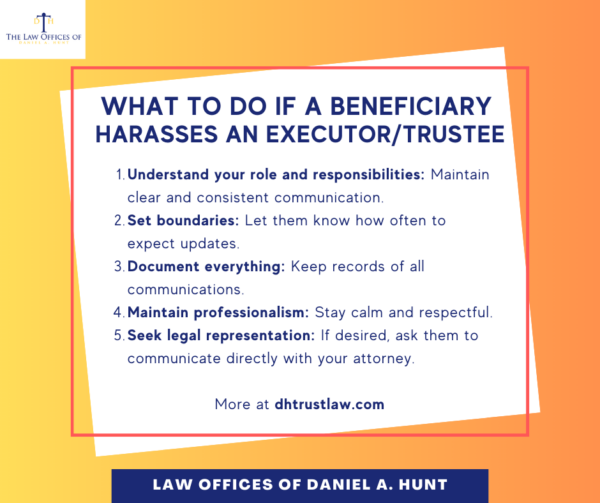What To Do If A Beneficiary Harasses an Executor

Dealing with an estate or trust administration can be a challenging and emotionally charged process. The executor or successor trustee is tasked with managing the deceased person’s affairs and distributing assets according to the will or trust. Sometimes they may find themselves in a contentious situation and may even experience harassment by a beneficiary or heir. Here’s what to do if a beneficiary harasses an executor or trustee.
#1 Understand Your Role and Responsibilities
First and foremost, it is essential to understand your duties as an executor, estate personal representative, or trustee. Your primary responsibility is to act in the best interests of the estate or trust and its beneficiaries.
According to the California Probate Code, “The trustee has a duty to keep the beneficiaries of the trust reasonably informed of the trust and its administration.” This means that the trustee has a fiduciary duty to communicate with the beneficiaries about the status of the trust administration and keep them in the loop. An executor has a similar duty to the estate heirs or beneficiaries.
A beneficiary is allowed to request information such as a copy of the estate plan, an update on the administration, or an accounting of your actions as executor or trustee. Such requests should be handled in a reasonably timely manner. The best defense against harassment is to maintain clear and consistent communication with the beneficiaries from the outset.
#2 Set Boundaries
It is important to set clear boundaries with the beneficiary. Politely but firmly communicate your availability and preferred methods of communication. Let them know the frequency with which they can expect updates and how you will handle inquiries. Setting these boundaries can help manage their expectations and reduce the frequency of confrontational interactions.
#3 Document Everything
Documentation is your best defense against harassment. Keep detailed records of all communications, whether they are emails, text messages, phone calls, or face-to-face conversations. Record the date, time, and content of each interaction. This documentation can serve as evidence if disputes arise.
#4 Maintain Professionalism
Even when faced with harassment, it is crucial to remain professional. Respond to all communications in a calm, clear, and respectful manner. Avoid engaging in arguments or responding emotionally. By maintaining professionalism, you protect yourself and demonstrate your commitment to fulfilling your duties objectively.
#5 Seek Legal Representation
If you haven’t already retained legal counsel to help with the trust or estate administration, it becomes even more crucial to do so if harassment is taking place. Find an experienced trust administration and probate attorney to represent your interests as executor or trustee.
Not only can your lawyer oversee the probate process or trust administration, but you can direct any problematic beneficiaries to communicate directly with your attorney instead of with you personally. This is usually the best course of action for dealing with aggressive beneficiaries.
Being an executor is a significant responsibility, and dealing with harassment from a beneficiary adds an unwanted layer of stress. By understanding your role, documenting all interactions, maintaining professionalism, and seeking legal advice when necessary, you can navigate these challenges effectively. Remember, your primary obligation is to the estate and all its beneficiaries, and sometimes protecting the estate means protecting yourself first.
If you have any questions about what to do if a beneficiary harasses an executor or trustee, feel free to contact our office.
Law Offices of Daniel A. Hunt
The Law Offices of Daniel A. Hunt is a California law firm specializing in Estate Planning; Trust Administration & Litigation; Probate; and Conservatorships. We've helped over 10,000 clients find peace of mind. We serve clients throughout the greater Sacramento region and the state of California.




